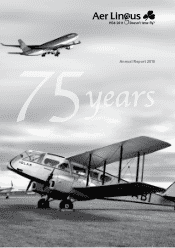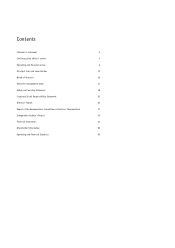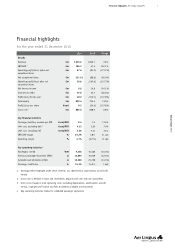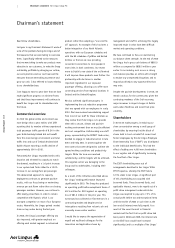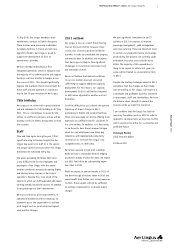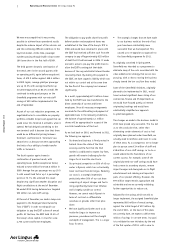Aer Lingus 2010 Annual Report Download - page 11
Download and view the complete annual report
Please find page 11 of the 2010 Aer Lingus annual report below. You can navigate through the pages in the report by either clicking on the pages listed below, or by using the keyword search tool below to find specific information within the annual report.
Annual Report 2010
9
Operating and fi nancial review Aer Lingus Group Plc
achieving the remaining savings in full, in
2012. That said, in-year delivery in 2011
from the additional initiatives is likely to be
reduced as it will take some time to implement
them. Areas that we are currently exploring
include the cross seasonal leasing of aircraft.
We will provide regular updates on our
progress during 2011.
Staff
2010 has been a year of substantial
achievement, none of which would have been
possible without the dedication and
commitment of our staff. We are extremely
appreciative of the loyalty shown by our staff,
their support of the Greenfi eld programme, and
their commitment to delivering great service
to our passengers. Whilst the majority of our
staff have been very supportive, 2010 has not
been entirely straightforward. In the second
half of 2010, we faced gradually escalating
industrial action from those members of our
cabin crew who are members of the IMPACT
union. These staff, who previously voted in
favour of fl ying 850 hours a year, expressed
dissatisfaction with some elements of the
rosters designed to implement the agreement.
Matters came to a head in early 2011, which
necessitated the hiring in of aircraft to
maintain our fl ight schedule. This and the
associated disruption to fl ights and bookings
will have an adverse effect on fi rst quarter
performance in 2011 performance. We believe
that the issue has now been satisfactorily
resolved without compromising on the
principle of 850 hours.
Pensions
The Irish Airline Superannuation Scheme
(IASS) is a multi employer scheme principally
for employees of the Dublin Airport Authority
(DAA) and Aer Lingus. The employers’
contribution is fi xed by the scheme’s Trust
Deed and Rules at 6.375% of pensionable
salaries. Under the Trust Deed, there is no
mechanism for increasing employer
contributions without the employers’ consent
and the company therefore accounts for the
scheme on a defi ned contribution basis.
However, for the purpose of paying benefi ts,
the scheme is a defi ned benefi t scheme as the
benefi ts payable are based on a member’s fi nal
salary. The IASS currently has a substantial
actuarial defi cit of circa €400 million on the
statutory minimum funding standard basis as
at 31/12/2010.
As part of the Greenfi eld agreements, Aer
Lingus agreed to take part in discussions with
Trade Unions representing members of the
IASS about the future of pension provision in
the group. These discussions have been taking
place under the auspices of the Labour
Relations Commission (LRC) and include the
DAA and representations of its staff. The terms
of reference of this process cover both the
provision of viable pension arrangements for
future service and a review of past service
arrangements.
No agreement has yet been reached, but
options under consideration for future pension
provisions for Aer Lingus employees include a
possible hybrid arrangement incorporating
either a capped defi ned benefi t or cash
balance element with a defi ned contribution
element above that cap.
Even if future service arrangements can be
agreed, the trustees of the IASS are likely to
be faced with a new deadline to agree a defi cit
reduction plan with the employers and to
submit a funding proposal to the Pensions
Board in summer 2011. Legislation permitting
pension scheme trustees to purchase sovereign
annuities was passed in December 2010. Such
annuity products may reference sovereign
bonds issued by Ireland and/or any other EU
country or countries. A launch date for this
arrangement remains uncertain and may be
linked to the outcome of a wider review of
funding standard issues.
Aer Lingus’ fi nancial obligation under the IASS
is limited to its contribution obligation as set
out in the Trust Deed and Rules and as
described above.
2010 fi nancial review
Summary
The Group returned to profi tability in 2010
with a €138.6m swing in the operating profi t
before net exceptional items, from a loss of
€81.0m in 2009 to a profi t of €57.6m in 2010.
Revenue increased slightly by 0.8%, with a
reduction in the number of passengers, arising
from capacity reductions, offset by strong yield
and strong ancillary revenue per passenger
performance. The key driver behind the
turnaround was the €128.7m reduction in
operating costs, with reduced fuel prices,
capacity related savings and Greenfi eld staff
costs savings being the key contributors.
EBITDAR has increased by €139.2m to €196.7m
and the Group recorded a net profi t for the year
of €49.2m (2009: loss of €130.1m).
Passenger fare and ancillary
revenue
Passenger fare and ancillary revenue for the
year was in line with 2009 at €1,166.2m,
despite a 10.0% reduction in the number of
passengers carried to 9.35m (2009: 10.38m).
Average fare per passenger increased by 12.0%
and revenue per passenger (i.e. fare revenue
plus ancillary revenue) increased by 11.0% to
€124.78. Total revenue per ASK rose 17.2% to
6.65 cents (2009: 5.68 cents). Total passenger
load factor increased by 1.6 points to 76.1%
refl ecting our strategy of achieving a better
match between the capacity we offer and the
natural level of demand in our markets.
Short haul
Short haul fare revenue was €725.0m, (2009:
€717.4m), an increase of 1.1%. However, short
haul passengers carried were down by 9.3% to
8.4m, indicating an 11.4% increase in average
fare to €85.92 (2009: €77.10). This
performance was largely due to a changed
approach to yield management. The increase
in short haul average fare was supplemented
by growth in ancillary revenue per passenger
of €0.92 or 5.5%.

